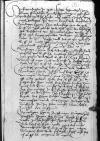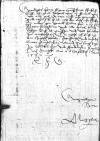 AAWO, AB, D.94, f. 113r
AAWO, AB, D.94, f. 113r
Hochwyrdigster in Gott Furste, Genedige(r) Herre,
Ewer Ffurstlichen Genod(en) szeynt meyne gehorsza(m)e unde stetwyllig(e) dynste noch meyne(m) hogest(en) vormog(en) allezceyt zcuvoran boreth unde bepholenn(n).
Genediger Herre.
Der almechtige Gott, der gebe E(wer) Ff(urstlichen) G(enoden) vyll gluck unde hell zcu der besitczu(n)g(e) des Ermland (Warmia, Varmia), diocese and ecclesiastical principality in northeastern Poland, 1466-1772 within the Kingdom of Poland, Royal Prussia⌊bisschtums von Ermela(n)tErmland (Warmia, Varmia), diocese and ecclesiastical principality in northeastern Poland, 1466-1772 within the Kingdom of Poland, Royal Prussia⌋. / Gott vorley E(wer) Ff(urstlichen) G(enoden) eyn langes, / gesundes / unde eyn gluckszeliges leben dozcu. / Whywoll das es von vylenn(n) E(wer) Ff(urstlichen) G(enoden) nicht gegunt wyrth etc., Gott ms. hatts reg. hat es⌈hattsms. hatts reg. hat es⌉ gleychwoll gefugeth. Laus Deo. /
Genediger Herre.
Ich bedanck(e) mich hochlich unde groszlich vor E(wer) Ff(urstlichen) G(enoden) trostliche cf. Ioannes DANTISCUS to Mathias PLATEN before 1537-09-28, CIDTC IDL 7345, letter lost⌊schreybung(en)cf. Ioannes DANTISCUS to Mathias PLATEN before 1537-09-28, CIDTC IDL 7345, letter lost⌋ ann myr gethan unde wyll E(wer) Ff(urstlichen) G(enoden) rotts folgenn(n), went(e) all meyn hell unde trosst in dysszer welt habe ich zcu E(wer) Ff(urstlichen) G(enoden) alsze zcu meyne(m) groszgunstig(en) genedig(en) lyben hernn unde vatter.
Genediger Herre, ich thu noch bytt(en) Ewer written over ...⌈... illegible⌈...... illegible⌉E(wer)Ewer written over ...⌉ Ff(urstlichen) G(enoden) vor meyne(n) svoger Hans Holsten (†after 1548)⌊Hans Holst(en)Hans Holsten (†after 1548)⌋, why ich offtmols gebeten habe, das E(wer) Ff(urstlichen) G(enoden) im beholfflichen szeyn wolle, das szeyne sachen zcum gutt(en) ende komen
mucht(en) or mucht(e)⌈mucht(en)mucht(en) or mucht(e)⌉. Unde bytt(e) och E(wer) Ff(urstlichen) G(enoden), das her mucht(e) in kenthnissze unde ku(n)tschafft kome(n)[1] an den hernn her Nikolaus Nibschitz (Mikołaj Nipszyc) (*ca. 1483 – †1541), royal courtier, diplomat in the service of Sigismund I and Albrecht von Hohenzollern-Ansbach, Dantiscus' friend; from 1525 until his death an official representative of Duke Albrecht at the Cracow royal court; from 1532 royal secretary; 1519 royal envoy to Albrecht von Hohenzollern, Grand Master of the Teutonic Order, 1525, 1526 envoy to Hungary, 1527 envoy to the Congress in Wrocław, 1531-1533, 1537 envoy to Ferdinand I of Habsburg, 1535-1537, 1540 envoy to Brandenburg, 1536 envoy to the estates of Livonia⌊NeppschiczNikolaus Nibschitz (Mikołaj Nipszyc) (*ca. 1483 – †1541), royal courtier, diplomat in the service of Sigismund I and Albrecht von Hohenzollern-Ansbach, Dantiscus' friend; from 1525 until his death an official representative of Duke Albrecht at the Cracow royal court; from 1532 royal secretary; 1519 royal envoy to Albrecht von Hohenzollern, Grand Master of the Teutonic Order, 1525, 1526 envoy to Hungary, 1527 envoy to the Congress in Wrocław, 1531-1533, 1537 envoy to Ferdinand I of Habsburg, 1535-1537, 1540 envoy to Brandenburg, 1536 envoy to the estates of Livonia⌋, / szo sichs begebe, / das szeyne sachen weyter an Sigismund I Jagiellon (Zygmunt I) (*1467 – †1548), King of Poland and Grand Duke of Lithuania (1506-1548); Duke of Głogów (Glogau) (1499-1506), Duke of Opava (1501-1506), Governor of Silesia (1504-1506); son of King Kazimierz IV Jagiellon and Elisabeth of Austria⌊ko(niglich)e m(ayeste)tSigismund I Jagiellon (Zygmunt I) (*1467 – †1548), King of Poland and Grand Duke of Lithuania (1506-1548); Duke of Głogów (Glogau) (1499-1506), Duke of Opava (1501-1506), Governor of Silesia (1504-1506); son of King Kazimierz IV Jagiellon and Elisabeth of Austria⌋ vorweyszett wurde, das her eyn zcutrytt unde zcuflucht / zcu im haben mucht(e), Gott hellf(e) im schyr dorausz.
Genediger Herre, do ist meyn svoger Hans Passzaw ⌊Ha(n)s PasszawHans Passzaw ⌋ zceger des brives. Bytthe E(wer) Ff(urstlichen) G(enoden) welle im och superinscribed⌈ochoch superinscribed⌉ beholfflichen szeyn in superinscribed⌈szeyn inszeyn in superinscribed⌉ szeyne(n) sachenn(n). Unde bytt(e) E(wer) Ff(urstlichen) G(enoden) welle myrs doch nicht vor arckwa(n) ker(en), das ich szo vor meyne Hans Passzaw ⌊svegersHans Passzaw ⌋ bytte unde schreybe. / Hoff(e) nicht, das ich E(wer) Ff(urstlichen) G(enoden) erczorne domytt(e).
 AAWO, AB, D.94, f. 113v
AAWO, AB, D.94, f. 113v
Genediger Herre, wife of Mathias PLATEN ⌊meyne hauszfrowewife of Mathias PLATEN ⌋ schicketh E(wer) Ff(urstlichen) G(enoden) eyne(n) stoppell van III fyrtell wax vor = III gr(oschen). Do war nicht mhe gemacht, / unde wyrth E(wer) Ff(urstlichen) G(enoden) mytt den erst(en) mhe schick(en).
Doneben eyn vyrtell ms. snure reg. schnur⌈snurems. snure reg. schnur⌉, sten = IX f(e)r(tones).
wife of Mathias PLATEN ⌊Meyne hauszfrowewife of Mathias PLATEN ⌋ unde alle gutt(en) frunde losszen E(wer) Ff(urstlichen) G(enoden) grusszen unde vyll gluckes zcuentbytthenn(n). Domytthe ich E(wer) Ff(urstlichen) G(enoden) dem hogest(en) bevele, / der ffrist(e) unde erhalt(e) Ewer Ffurstlichenn(n) Genod(en) zcu lang(en) tag(en) inn glucklichem unde ffredelichem regime(n)t(e).
 AAWO, AB, D.94, f. [2] missed in numbering after f. 117
AAWO, AB, D.94, f. [2] missed in numbering after f. 117


